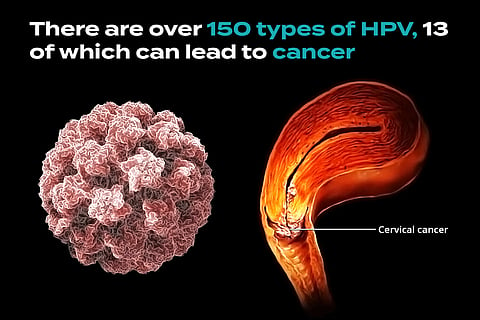Bridging the Gap - Health Equity for all
If You’re Sexually Active, You’ve Probably Gotten HPV Before
<p>For many years now, research has shown that most of us do not use condoms during oral sex. The medical messaging is clear that we should, but this advice appears to be a buzzkill too far.</p>
<p>Understanding the realities of human papillomavirus (HPV) may warm you to the taste of flavored condoms, however. Buckle up for the ride ahead.</p>
<h2>HPV is everywhere</h2>
<p>HPV refers to a group of related viruses that can infect the skin and mucous membranes, causing health conditions like genital warts and cancer. </p>
<p>HPV is the most common sexually transmitted infection (STI) around. More than 90% of sexually active men and 80% of sexually active women will get some form of HPV in their lifetime. Around 50% of HPV infections involve certain high-risk types, including those that cause cancer.</p>
<p>Over 80 million Americans are infected with HPV, and every year, there are around 13 million new cases (including teens).</p>
<h3>HPV has many strains</h3>
<p>There are over 150 strains of the HPV virus, and each one has a number, e.g., HPV 11 or HPV 6, both of which are connected to genital warts. Although 13 types are linked to cancer, most HPV strains do not pose a serious health risk. HPV strains are categorized as either low-risk or high-risk.</p>
<h3>The spread of HPV</h3>
<p>HPV spreads through intimate skin contact. You can contract HPV through vaginal, anal, or oral sex with someone who has the virus, even if they are symptomless. You can get HPV even if you have only had sex with one person.</p>
<p>HPV is usually symptomless and most people who have it don’t have any problems. Sometimes, however, the virus can cause painless growths (genital warts) around your vagina, penis, or anus.</p>
<h2>Genital warts</h2>
<p>The most visible sign of an HPV infection is genital warts. These growths are fleshy in color and appear on the genital area, but they can also appear in the mouth or throat after oral sex with an infected individual. </p>
<h2>Cancer and HPV</h2>
<figure><img alt="" height="517" src="https://cdn.storymd.com/optimized/KAMkBMtLd7/original.gif" width="389" />
<figcaption>HPV and Cancer <em>Source: National Cancer Institute (NCI)</em></figcaption>
</figure>
<p>9 in 10 HPV infections go away on their own within 2 years, and this is true of both cancerous and non-cancerous HPV types. Other HPV infections can last longer and cause certain cancers, including those of the:</p>
<ul>
<li>Cervix, vagina, and vulva</li>
<li>Penis</li>
<li>Anus</li>
<li>Throat (oropharyngeal cancer)</li>
</ul>
<p>HPV 16 and 18 are considered the most high-risk. They significantly raise the risk of cervical, vaginal, and vulvar cancer in women and penile cancer in men. Cancer often takes years if not decades to develop after an HPV infection. There are around 36,000 cases of cancer caused by HPV in the US every year.</p>
<h3>HPV cancer stats</h3>
<p>HPV is thought to be responsible for over 90% of anal and cervical cancers, around 70% of vaginal and vulvar cancers, and 60% of penile cancers. </p>
<p>Oropharyngeal cancers have long been connected to tobacco and alcohol, but recent research suggests that 60% to 70% of these cancers may be connected to HPV. Many of these cancers may be sourced back to a combination of tobacco, alcohol, and HPV.</p>
<h3>Am I at risk?</h3>
<p>We can’t know for sure who will develop cancer or other health issues from HPV. People with weak immune systems may be less capable of fending off HPV, and they may also be more likely to develop health problems as a result.</p>
<h2>The HPV vaccine</h2>
<h3>What does it do?</h3>
<p>The HPV vaccine is the most effective way to prevent HPV infection. It protects against HPV types that most often cause penile, vaginal, cervical, vulvar, and anal cancers, as well as the types most likely to cause genital warts. Research shows the HPV vaccine is nearly 100% effective a month after a person completes the full series.</p>
<p>The design of the vaccine involves empty HPV shells that help your immune system to recognize the virus if infected. In the end, the vaccine prevents cervical cells from becoming cancer.</p>
<figure><img alt="" height="390" src="https://cdn.storymd.com/optimized/pA7932Hld9/original.jpg" width="657" />
<figcaption>HPV Vaccine <em>Source: U.S. Air Force photo by Staff Sgt. Benjamin W. Stratton</em></figcaption>
</figure>
<h3>Gardasil 9</h3>
<p>Gardasil 9 is an HPV vaccine that protects against 9 HPV types, including the 7 types most likely to cause HPV-related cancers (16, 18, 31, 33, 45, 52, and 58). It also protects you against 2 low-risk types that cause most genital warts (6 and 11).</p>
<h3>At what age should you get vaccinated? </h3>
<p>Experts recommend that HPV vaccination should start at age 11 or 12, though they can be administered as early as 9 years of age. Vaccination is still recommended through age 26 as a catch-up measure.</p>
<p>The vaccine doesn’t treat HPV infections which is why we aim to administer it before sexual activity begins as this makes it as effective as possible. Following sexual activity, you are much more likely to have been exposed already.</p>
<h2>How can I avoid the dangers of HPV?</h2>
<p>You have several options:</p>
<ul>
<li><strong>HPV vaccine</strong>. The HPV vaxx is safe and effective and it protects against diseases (including cancers) caused by HPV.</li>
<li><strong>Screening for cervical cancer. </strong>Routine screening for women between 21 and 65 years old can prevent cervical cancer.</li>
<li>If you are sexually active:
<ul>
<li><strong>Use condoms every time you have sex</strong>. This will lower your chances of an infection, although HPV can infect areas that the condom does not cover.</li>
<li><strong><strong>Be in a mutually monogamous relationship. </strong></strong>Keeping things within a trusted relationship reduced the odds of an HPV infection.</li>
</ul>
</li>
</ul>
<h2>More on HPV</h2><ul><li><a href="https://soulivity.storymd.com/journal/dmqpoe3uew-hpv" target="_blank">HPV (Human Papillomavirus): Transmission, Symptoms, Prevention</a></li><li><a href="https://soulivity.storymd.com/journal/wdo26lvf4j-hpv-and-cancer" target="_blank">Human Papillomavirus (HPV) And Cancer: What You Need to Know</a></li><li><a href="https://soulivity.storymd.com/journal/lw2zl87c8w-hpv-vaccines" target="_blank">Human Papillomavirus (HPV) Vaccines</a></li></ul>


